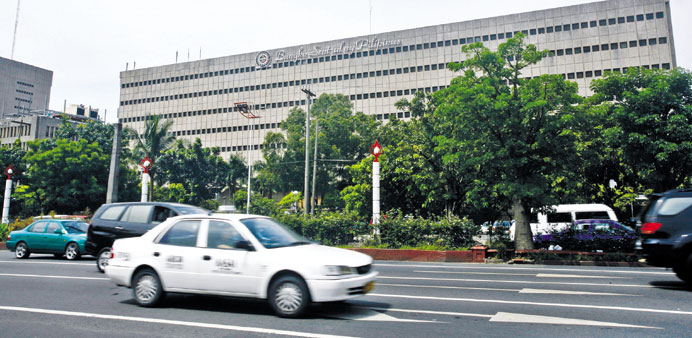Cars travel past the Bangko Sentral ng Pilipinas, the Philippine central bank, in Manila. The need for an Islamic finance law has now clearly been acknowledged by the central bank.
By Arno Maierbrugger/Gulf Times Correspondent /Manila
The Philippine government is planning to issue Islamic bonds, or sukuks, for the first time in the predominantly catholic country in order to finance a number of infrastructure programmes and generally raise awareness for Islamic finance, according to National Treasurer Rosalia de Leon. For this “completely new asset class”, the government would be pre-eminently looking for investors from the Middle East, she added.
The move comes as non-Muslim countries are increasingly developing a taste for Shariah-compliant bonds, whose repayment is based on asset-backed profit or lease payments and not on interest, making it more resilient to financial crises and market volatility and ideal for long-term financing of larger projects.
The UK, South Africa, Hong Kong and Luxembourg all have recently entered the race of issuing sukuks as the first non-Muslim countries to do so.
However, for the Philippines, the idea of a sovereign sukuk issuance is not exactly new. The country’s first and only Islamic bank, state-owned Al Ahmanah Islamic Bank, based in Zamboanga City in the Philippines’ southern Muslim province of Mindanao, as early as in 2010 came up with the idea to sell Islamic notes to finance infrastructure projects in the poorest and least developed parts of the Philippines’ south. However, lack of regulations for an Islamic finance market in the Philippines has made a sukuk issuance unviable so far.
But the need for an Islamic finance law has now clearly been acknowledged by the central bank. Furthermore, with a Mindanao peace deal signed recently that ended decades of violent insurgency, the prospects of building up an Islamic banking industry in the Philippines have become much more promising.
“We are currently in the very early stages of drafting a general law for the creation and regulation of Islamic banks,” the Philippines’ central bank governor Amando M Tetangco said earlier this year, adding that the central bank is seeking a “critical mass” of market players which would enable them “to provide innovative products and services” to customers. New regulations would also allow conventional banks to open so-called Islamic windows and launch Islamic banking services all over the country.
Presently, the Philippines’ general banking law passed in 2000 prohibits the creation of any other Islamic bank in the country, a situation that the central bank wants to address in a first step.
A new Islamic banking law could also not only boost the issuance of sukuks and make financing for the Philippines‘ chronic infrastructure problems easier, and also tap a completely new banking segment in the country, it would also raise more awareness of Middle East investors at a time when the Philippine economy is in an impressive economic upswing - on the top of what is already underway.
For example, Qatar and the Philippines in 2012 agreed to set up a $1bn investment fund that would focus on projects in agriculture, energy, halal food, labour, mining, petrochemicals, real estate, steel, tourism, trade and infrastructure development.
The UAE’s Abraaj Group, a private equity investor with $7.5bn under management, has so far invested more than $200mn in the Philippines’ consumer and retail space and has signalled the appetite for more investments in sectors such as logistics, manufacturing, healthcare and education in a long-term commitment. Certainly both would have interest in Philippine sovereign sukuks too.

